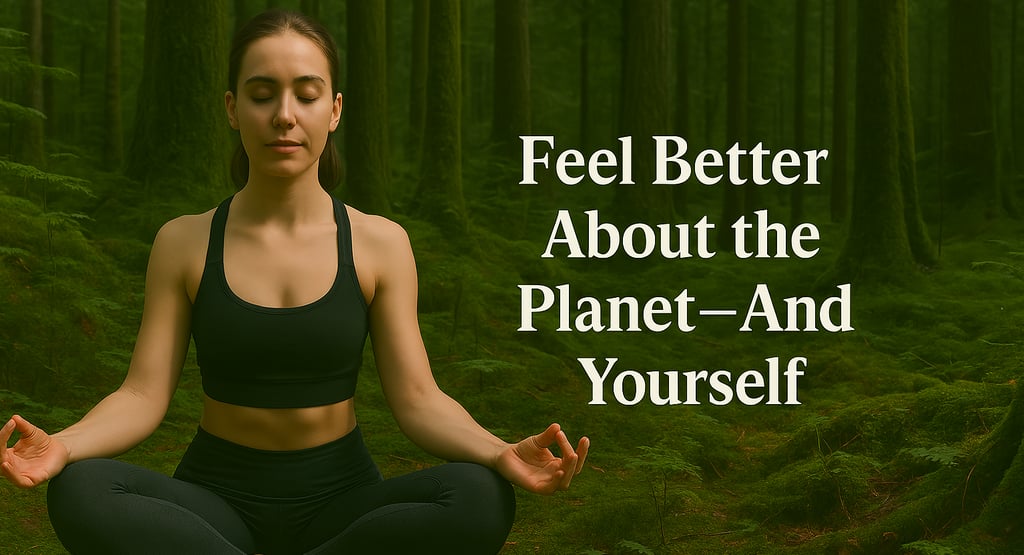Greener Mind, Calmer Life
Eco-anxiety is the stress or fear caused by climate change and environmental concerns. This blog offers simple ways to understand and manage it.
6/12/20255 min read
Understanding Eco-Anxiety: What It Is and Why It Matters
Eco-anxiety is an emerging psychological phenomenon characterized by heightened levels of anxiety and distress triggered by environmental concerns, particularly those related to climate change and ecological degradation. This form of anxiety is not a formal diagnosis but rather a descriptor for the mental health challenges that arise as individuals grapple with the stark realities of global environmental crises. The urgency surrounding climate change manifests in feelings of helplessness, fear, and uncertainty about the future, thus reflecting a significant shift in how individuals perceive their relationship with the planet.
Go straight to the inner piece program.
Research indicates that eco-anxiety can lead to a range of emotional responses, including sadness, anger, and even guilt. According to a study published by the American Psychological Association, about 68% of Americans are worried about the effects of climate change. The emotional impact is particularly pronounced among younger generations, who face the daunting prospect of inheriting an uncertain environmental future. For many, the weight of ecological concerns intersects with their developmental stage, leading to a world outlook steeped in anxiety.
Demographic groups notably affected by eco-anxiety include millennials and Generation Z, who are particularly attuned to environmental issues due to their upbringing in a period marked by alarming media coverage and scientific reports on climate decline. These individuals often express their feelings through activism and advocacy, seeking to address these overwhelming concerns. Furthermore, research highlights that marginalized communities, especially those in developing nations, may experience eco-anxiety more intensely, as they are disproportionately affected by environmental degradation, exacerbating existing social inequalities.
In summary, understanding eco-anxiety involves recognizing its psychological origins and acknowledging its implications on individuals. As the impacts of climate change become increasingly tangible, the mental health challenges associated with eco-anxiety necessitate attention and proactive intervention, highlighting the importance of supporting mental well-being within the broader environmental discourse.
Common Questions About Eco-Anxiety: Answers You Need
As society becomes increasingly aware of environmental issues, many individuals find themselves grappling with feelings of anxiety and distress related to ecological changes. This emotional response, termed eco-anxiety, raises several questions among those affected. Here, we address some of the most frequently asked questions regarding eco-anxiety to promote understanding and awareness.
1. What are the symptoms of eco-anxiety? Eco-anxiety manifests in various ways, resembling classic anxiety symptoms. Common signs include persistent worry about environmental degradation, feelings of helplessness, changes in sleep patterns, and physical symptoms such as headaches or fatigue. Individuals may also experience emotional distress, such as sadness or anger about climate issues, which can affect their daily lives and interactions.
2. How can one identify if someone is suffering from eco-anxiety? Recognizing eco-anxiety in others may involve observing changes in behavior and emotional states. A person may frequently express concern over environmental issues, show signs of distress when discussing climate change, or become withdrawn in social settings. Additionally, they may often seek out information related to environmental crises, indicating an overwhelming desire to understand and control the situation.
3. How does eco-anxiety differ from other forms of anxiety? While eco-anxiety shares characteristics with generalized anxiety disorder (GAD), its focus on environmental concerns makes it distinct. Eco-anxiety is typically rooted in forward-thinking worry about ecological disasters and their implications for the planet and future generations. In contrast, anxiety disorders like GAD might encompass a broader spectrum of worries unrelated to environmental factors.
Understanding eco-anxiety is essential for identifying effective coping strategies and fostering supportive conversations. By addressing these questions, we can normalize discussions around environmental stress, helping individuals find solace in shared experiences and collective efforts to combat ecological challenges.
Yes, I want the InnaPeace Program.
Tips and Tricks to Relieve Eco-Anxiety
Eco-anxiety is increasingly becoming a prominent concern as individuals grapple with the environmental crisis. Fortunately, there are numerous strategies that one can employ to mitigate this stress and foster a healthier relationship with the planet. Here are some practical tips and tricks that may help alleviate eco-anxiety:
Engage in Mindfulness Practices: Mindfulness can help ground individuals in the present moment, allowing them to cultivate a sense of peace amidst environmental worries. Techniques such as meditation, deep breathing, or yoga not only reduce anxiety levels but also enhance awareness of one’s surroundings. Spending time in nature can further deepen this mindfulness practice, as it connects individuals with the very environment they are concerned about. I am not the best meditator so I personally enjoy the mindful meditation vibes myself. You may want to check it out. Listen to your preferred vibe every day before you start your day.
Community Involvement: Engaging with like-minded individuals who share your ecological concerns can alleviate feelings of isolation. Participating in local environmental initiatives, such as beach clean-ups or tree planting events, fosters a sense of purpose and community. This collective action not only contributes positively to the environment but also reinforces social connections, further mitigating feelings of anxiety.
Adopt an Eco-Friendly Lifestyle: Embracing sustainable practices in daily life can empower individuals and counter feelings of helplessness associated with eco-anxiety. Simple changes such as reducing plastic use, recycling, or opting for sustainable fashion can provide a sense of control over one’s ecological footprint. Moreover, consuming locally produced foods can strengthen the connection to one’s community and environment.
Self-Care Practices: Implementing self-care routines is essential in maintaining mental well-being. Here are a few practices that can reduce anxiety:
Journaling – reflecting on your thoughts and feelings can help process eco-related stress.
Meditation – focusing on breath can create calm during periods of overwhelming anxiety.
Art therapy – expressing emotions through creative outlets fosters healing and clarity.
Finding balance in addressing environmental concerns while caring for one’s mental health is crucial. By integrating these tips and tricks into daily routines, individuals can foster a more positive relationship with the environment and reduce eco-anxiety effectively.
Yes, I want the InnaPeace Program!
Products, Vitamins, Hobbies, and Activities to Improve Eco-Anxiety
Addressing eco-anxiety requires a multifaceted approach that can include the use of various products, vitamins, and hobbies aimed at promoting well-being and enhancing one’s connection with the environment. Selecting the right tools can be pivotal in reducing feelings of worry about environmental issues. the buddha board may work, it seems to work wonders for some people.
Among the products that can help alleviate eco-anxiety are essential oils and calming herbal teas. Both options provide therapeutic effects that can help ease stress and promote relaxation. For instance, lavender essential oil is renowned for its calming properties, while chamomile tea has been shown to reduce anxiety levels. Choosing eco-friendly brands ensures that these products not only benefit personal health but also align with sustainable living practices.
In addition to calming products, vitamins and supplements play a significant role in mental health. Omega-3 fatty acids, often found in fish oil, are linked to improved mood and reduced anxiety. Vitamin D is another essential nutrient that supports mental clarity and emotional resilience. Integrating these supplements into one’s daily routine can provide improved emotional health, particularly in times of environmental distress. I preferer gummies as they are easier to take. You can check the Hello Happy gummies.
Supplements & Vitamins That May Help
Always consult a healthcare provider before starting new supplements—especially if you’re taking other medications.
1. Magnesium
Why: Helps calm the nervous system and reduce anxiety.
Sources: Magnesium glycinate (most calming), leafy greens, nuts, seeds.
2. Omega-3 Fatty Acids
Why: Supports brain health, reduces inflammation, and stabilizes mood.
Sources: Fish oil supplements, flaxseed, chia, walnuts.
3. B-Complex Vitamins
Why: Essential for nervous system regulation and energy production.
Key B vitamins: B6, B9 (folate), B12 especially support mood and cognition.
4. Vitamin D3
Why: Low levels are linked to seasonal depression and general low mood.
Sources: Sunlight exposure, supplements, fortified foods.
5. Adaptogens (Optional but helpful)
Examples: Ashwagandha, Rhodiola, Holy Basil.
Why: Help the body adapt to stress and support adrenal balance.
Engaging in hobbies and outdoor activities is equally important in combating eco-anxiety. Connecting with nature can be incredibly therapeutic; activities such as gardening or hiking not only promote physical health but also foster a sense of community and belonging. Sustainable living projects, such as creating a compost system or an urban garden, can empower individuals by providing them with a tangible way to contribute positively to the environment. These empowering hobbies can cultivate a sense of hope and purpose amidst often overwhelming environmental concerns.
By incorporating these products, supplements, InnaPeace program and activities into daily life, individuals can effectively manage eco-anxiety while fostering a deeper connection to the planet.
Take me to the complete InnaPeace Meditation program.
Reviews
Honest product reviews to help your decisions.
Contact
contact@justasec.me
© 2025. All rights reserved.


